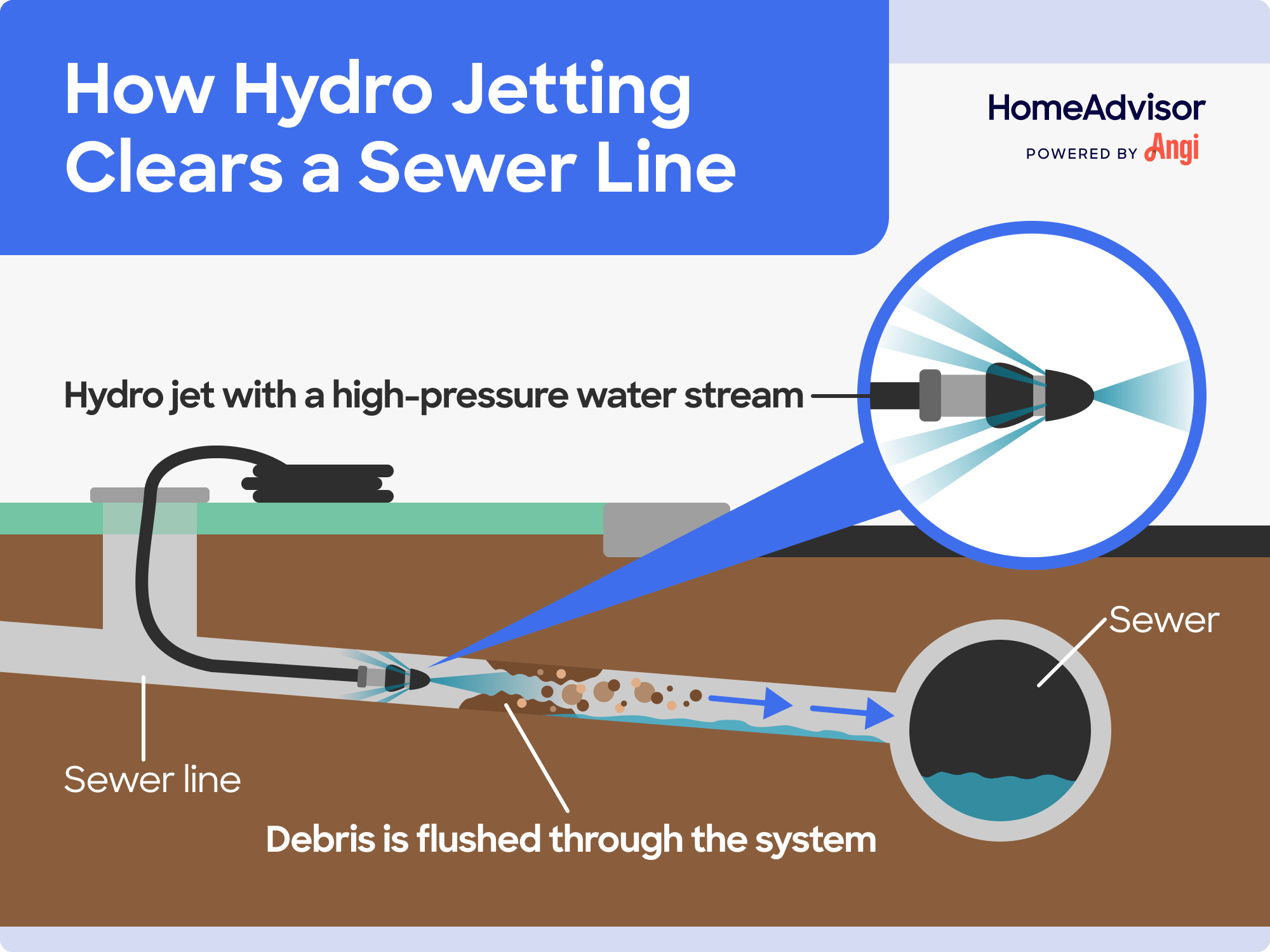
Curious who to call for drain flies? See why a drain cleaning company beats pest control, how pros fix it, and what a simple job costs.
Hydro jetting costs an average of $475 for standard residential service
Hydro jetting costs between $350 and $600, with an average of {AvgCost}.
Prices range from $100 for minor clogs to $2,000 for severe blockages.
Severity of clog, pipe accessibility, and sewer line length significantly impact your final bill.
Professional plumbers charge between $45 and $200 per hour for this service.
Hiring an experienced plumber prevents future blockages by thoroughly removing all buildup from pipe walls.
This article was created using automation technology and thoroughly fact-checked and edited by HomeAdvisor Editor Ryan Noonan.
Most homeowners spend between $350 and $600 for standard residential hydrojetting services. Hydro jetting offers a powerful solution that uses pressurized water to blast away stubborn clogs from your plumbing system. Factors such as the clog severity, location, and labor rates determine your total costs. While minor issues might cost as little as $100 to resolve, severe blockages requiring extensive work can reach $2,000. Hiring a professional plumber ensures the clog is removed correctly and addresses underlying issues to prevent future problems.

Several key variables influence what you'll ultimately pay for professional hydro jetting services. Understanding these factors can help you anticipate expenses before scheduling an appointment.
The complexity and nature of your blockage significantly affect the final price. Simple kitchen sink clogs cost less to clear than major sewer line obstructions. Particularly challenging situations like tree root intrusions require specialized equipment and more time to resolve correctly.
When your pipes are easily accessible through existing cleanouts or access points, service costs stay lower. However, when plumbing runs beneath concrete slabs, behind walls, or requires excavation to reach, expect the price to increase accordingly. Difficult access situations may add substantial labor time to your project.
Larger diameter pipes require more water volume and pressure to clean effectively. Similarly, longer sewer lines take more time to thoroughly jet from end to end. Both factors can increase your total service cost, as they demand more resources and technician time to complete correctly.
Professional plumbers near you charge between $45 and $200 per hour for hydro jetting services. This rate variation depends on factors like geographic location, company reputation, and whether you need emergency or after-hours service. The complexity of your specific situation will determine how many billable hours are required.
Before tackling a clog yourself, consider the differences between DIY approaches and professional service. Attempting hydro jetting yourself comes with significant challenges. Consumer-grade equipment often cannot match the power of professional systems, and improper use can damage your plumbing system.
For most homeowners, the upfront cost of purchasing a portable jetter ($1,500-$2,000) makes professional service more economical unless you anticipate frequent use. Hiring an experienced plumber ensures the job is done correctly and helps you save by only paying when the service is needed.
Beyond the basic hydro jetting service, you might encounter the following expenses depending on your situation.
| Service | Purpose | Average Cost |
|---|---|---|
| Sewer line inspection | Locates and assesses blockages | $275–$1,800 |
| Toilet removal | Provides access to specific drain lines | $50–$200 |
| Tree root removal | Clears invasive roots from pipes | $100–$600 |
| Sewage backup cleanup | Sanitizes contaminated areas | Up to $3,000 |
| Sewer cleanout installation | Creates a permanent access point | $2,700 |
| Pipe repair or replacement | Addresses damaged sections | $60–$250 per lin. ft. |
While the cost of sewer line camera inspections adds to your initial expense, it can save money by precisely identifying problem areas before work begins. Similarly, installing a proper cleanout access point represents a worthwhile investment for properties prone to recurring blockages.
Consider these strategies to manage costs while ensuring effective results:
Create proper access points through cleanout installation to reduce future service expenses.
Prevent future blockages by avoiding the disposal of grease, wipes, and other problematic materials.
Request service quotes from multiple qualified professionals to compare pricing options.
Ask about package deals that might include camera inspection with your hydro jetting service.
Schedule preventative maintenance to avoid emergency service surcharges down the road.
No place is more important than your home, which is why HomeAdvisor connects homeowners with local pros to transform their houses into homes they love. To help homeowners prepare for their next project, HomeAdvisor provides readers with accurate cost data and follows strict editorial guidelines. After a project is complete, we survey real customers about the costs to develop the pricing data you see, so you can make the best decisions for you and your home. We pair this data with research from reputable sources, including the U.S. Bureau of Labor Statistics, academic journals, market studies, and interviews with industry experts—all to ensure our prices reflect real-world projects.
From average costs to expert advice, get all the answers you need to get your job done.

Curious who to call for drain flies? See why a drain cleaning company beats pest control, how pros fix it, and what a simple job costs.

Use this guide to budget for an upcoming plumbing inspection cost based on factors such as home size, inspection type, labor, and required repairs.

Explore how factors such as materials, local labor rates, and the type of damage affect the cost to repair a burst pipe.

Use this guide to budget for the cost of a plumber based on factors like labor rates, experience levels, repair type, job complexity, and more.

The cost to repipe a house depends on your home’s size, the number of fixtures, and the pipe material. Understand all the cost factors before you take on this project.